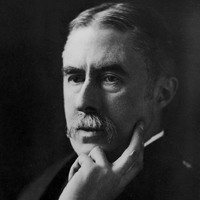Alfred Edward Housman - Biography and Works
Alfred Edward Housman was born in Shropshire, England. He was a classical scholar, and he taught Latin at the University of London and at Cambridge University. Housman wrote apparently very simple lyrics, but usually kept an underlying level of irony and pessimism in his poems. He was a very shy sort of person.

A. E. Housman (1859-1936)
He wrote poems that were carefully perfected in rhythm, rhyme and diction. The poems are usually too simple, and we even doubt whether so simple things can be poetic at all. On a careful rereading, we find certain hints and clues that suggest that the poet is not so optimistic.
Housman uses the rhythm of classical lyric and traditional English ballads. As usual, Housman sings about natural beauty. But on a critical reading, we see that he is dealing with the transitoriness of human life in contrast of the permanence of nature, the indifference of the nature towards human excitement with it, and the fact that life and youth are covered with the tragedies of impending old age and death. He also wrote melancholy lyrics about human suffering. His outlook on life was pessimistic, and his poems characteristically express the fleeting quality of love and beauty.
Housman projects the character of the doomed young countryman- soldier, farmer, criminal, lover and refers to him as lad with a literary reminiscence. His greatest artistic achievement was to wring emotion out of controlled simplicities in verse form. The tone of combined elegy and irony is the true Houseman's unique feature.
Housman was a poet of limited range and small output, whose deeply melancholy temperament and classical sense of form were combined with an oddly histrionic streak. His elemental themes are the transience of life and especially of youth, the beauty and indifference of nature, the betrayals and ill chances that threates love and friendship the necessity of endurance and so on.
Housman is now chiefly remembered for the poems first collected in A Shropshire Lad (1896), a series of melancholy and nostalgic ballads. He published only two books of verse: A Shropshire Lad (1896) and Last Poems (1922). After his death, his brother Laurence published More Poems (1936), Collected Poems (1939) and Manuscript Poems (1955).
